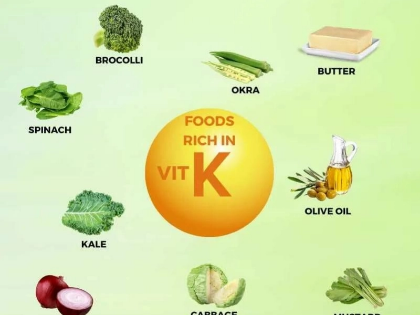Nuts for Heart Health: How Little Foods Can Do a Lot for Your Heart
A daily serving of one ounce of nuts may increase your levels of "good" cholesterol and decrease "bad" cholesterol, LDL cholesterol, and triglycerides. They are also high in heart-healthy lipids and dietary fibre. Nut consumption was found to be inversely correlated with both coronary heart disease (CHD) and overall cardiovascular disease (CVD) in multiple prospective cohort studies.1–5 nuts are also high in magnesium, potassium, folate, vitamin E, healthful unsaturated fats, protein, and phytosterols.
Cashews
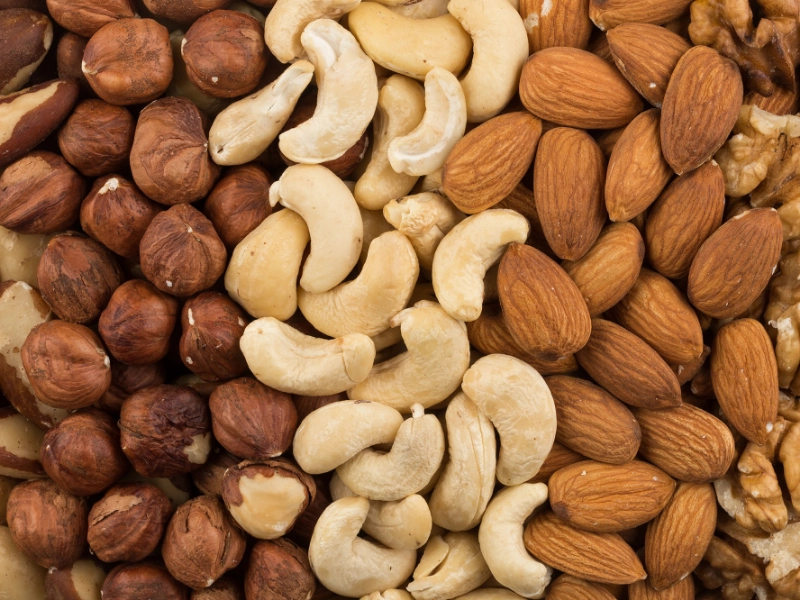
Pistachios
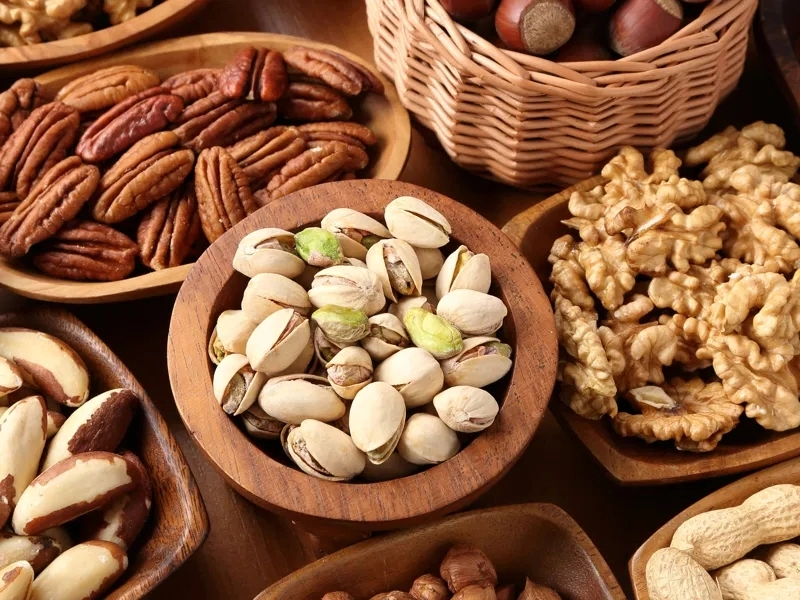 Nutritious and delicious, pistachios make a great snack. Pistachios are green oval kernels that are abundant with fibre, protein, and healthy fats. They are gathered from the pistachio tree, which is related to the cashew and mango trees. Phytosterols, which help to reduce the absorption of cholesterol, are also present in them.
Pistachios, like the majority of nuts, contain nitric oxide, which causes blood vessels to expand and enhance endothelial function. According to one study, individuals who consumed 1.5 ounces of pistachios daily showed improvements in these heart-healthy parameters (43).
Pistachio consumption may drop blood pressure, both diastolic and systolic, which can lower the risk of cardiovascular disease, according to a 2016 analysis. Try incorporating them into your preferred stir-fries, salads, and soups.
Nutritious and delicious, pistachios make a great snack. Pistachios are green oval kernels that are abundant with fibre, protein, and healthy fats. They are gathered from the pistachio tree, which is related to the cashew and mango trees. Phytosterols, which help to reduce the absorption of cholesterol, are also present in them.
Pistachios, like the majority of nuts, contain nitric oxide, which causes blood vessels to expand and enhance endothelial function. According to one study, individuals who consumed 1.5 ounces of pistachios daily showed improvements in these heart-healthy parameters (43).
Pistachio consumption may drop blood pressure, both diastolic and systolic, which can lower the risk of cardiovascular disease, according to a 2016 analysis. Try incorporating them into your preferred stir-fries, salads, and soups.
Almonds
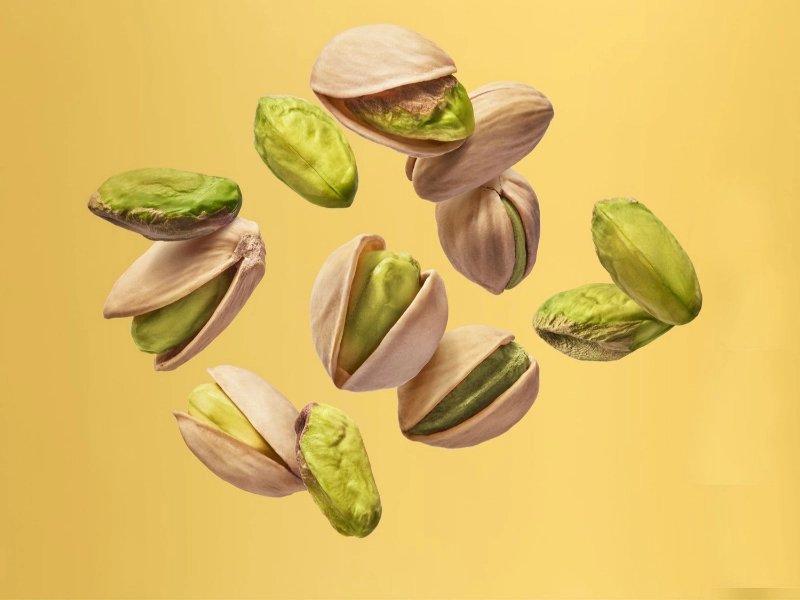 Almonds are an excellent source of heart-healthy monounsaturated fat and are high in protein and healthy fats. This lipid is a potent antioxidant, decreases low-density lipoprotein cholesterol, and aids in blood sugar regulation.
Important vitamins and minerals like manganese, magnesium, and vitamin E are also abundant in almonds. These nutrients aid in stress reduction, promote the health of bones and muscles, and lessen bodily inflammation.
Almonds were found to improve vascular function when salty or sugary snacks were substituted, according to a study published in the American Journal of Clinical Nutrition. They also reduced triglyceride, total cholesterol, and low-density lipoprotein (LDL) levels. As almonds don't increase blood sugar, they are a great option for diabetics.
Almonds are an excellent source of heart-healthy monounsaturated fat and are high in protein and healthy fats. This lipid is a potent antioxidant, decreases low-density lipoprotein cholesterol, and aids in blood sugar regulation.
Important vitamins and minerals like manganese, magnesium, and vitamin E are also abundant in almonds. These nutrients aid in stress reduction, promote the health of bones and muscles, and lessen bodily inflammation.
Almonds were found to improve vascular function when salty or sugary snacks were substituted, according to a study published in the American Journal of Clinical Nutrition. They also reduced triglyceride, total cholesterol, and low-density lipoprotein (LDL) levels. As almonds don't increase blood sugar, they are a great option for diabetics.
Candies
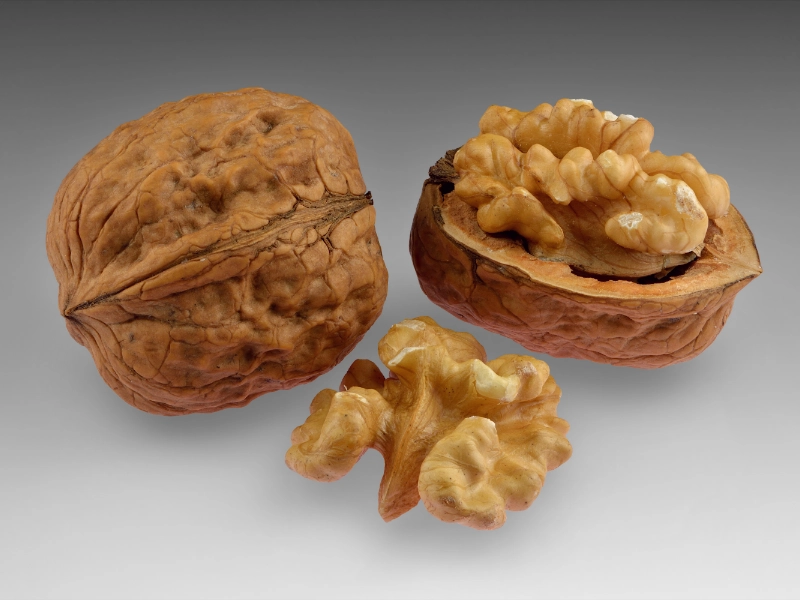 Numerous studies suggest that nuts are a hearty food choice, particularly walnuts and pecans, which are both derived from hickory trees. They can assist in lowering blood triglycerides, LDL, or "bad," cholesterol, and cholesterol levels.
These heart-healthy foods are a fantastic choice for people who follow a gluten-free diet or have coeliac disease because they are naturally low in salt and gluten. They also supply a good amount of fibre, protein, and healthy fats, all of which increase satiety and metabolism and make you feel full.
Consuming a small amount of unsalted nuts on a daily basis can help avoid high blood pressure by reducing your sodium consumption and satisfying your desires for salty snacks.
Numerous studies suggest that nuts are a hearty food choice, particularly walnuts and pecans, which are both derived from hickory trees. They can assist in lowering blood triglycerides, LDL, or "bad," cholesterol, and cholesterol levels.
These heart-healthy foods are a fantastic choice for people who follow a gluten-free diet or have coeliac disease because they are naturally low in salt and gluten. They also supply a good amount of fibre, protein, and healthy fats, all of which increase satiety and metabolism and make you feel full.
Consuming a small amount of unsalted nuts on a daily basis can help avoid high blood pressure by reducing your sodium consumption and satisfying your desires for salty snacks.
Almonds
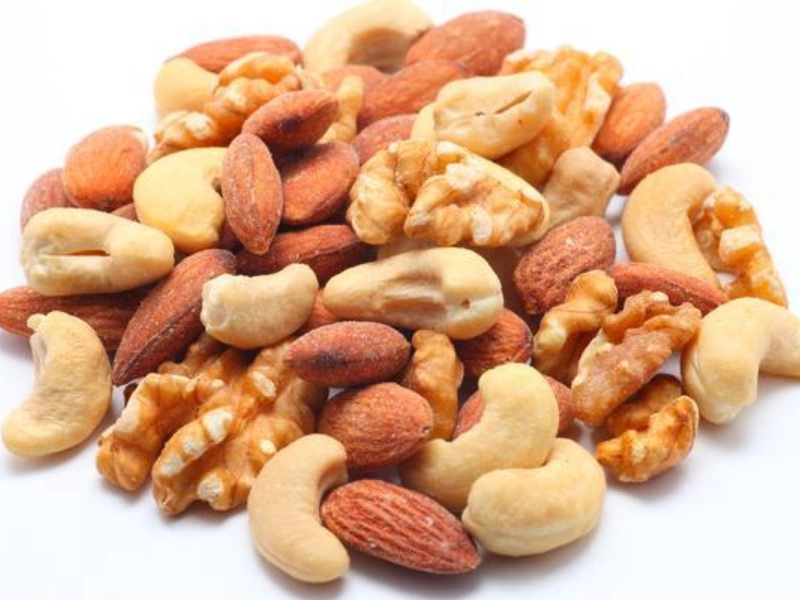 Regular nut consumption is linked to a lower risk of coronary heart disease (CHD) and other cardiovascular risk factors. (5-8)
Compared to those who never or never ate nuts and peanuts, those who ate them two or more times a week had a 14% reduced risk of cardiovascular disease and a 20% lower risk of coronary heart disease (CHD). These major prospective cohort studies include the Nurses’ Health Study and the Health Professionals Follow-up Study.
Consuming three to four handfuls of nuts, seeds, or peanut butter per week may help lower your risk of heart disease; however, choose unsalted or dry-roasted kinds to avoid overindulging in salt.
Regular nut consumption is linked to a lower risk of coronary heart disease (CHD) and other cardiovascular risk factors. (5-8)
Compared to those who never or never ate nuts and peanuts, those who ate them two or more times a week had a 14% reduced risk of cardiovascular disease and a 20% lower risk of coronary heart disease (CHD). These major prospective cohort studies include the Nurses’ Health Study and the Health Professionals Follow-up Study.
Consuming three to four handfuls of nuts, seeds, or peanut butter per week may help lower your risk of heart disease; however, choose unsalted or dry-roasted kinds to avoid overindulging in salt.
Nuts
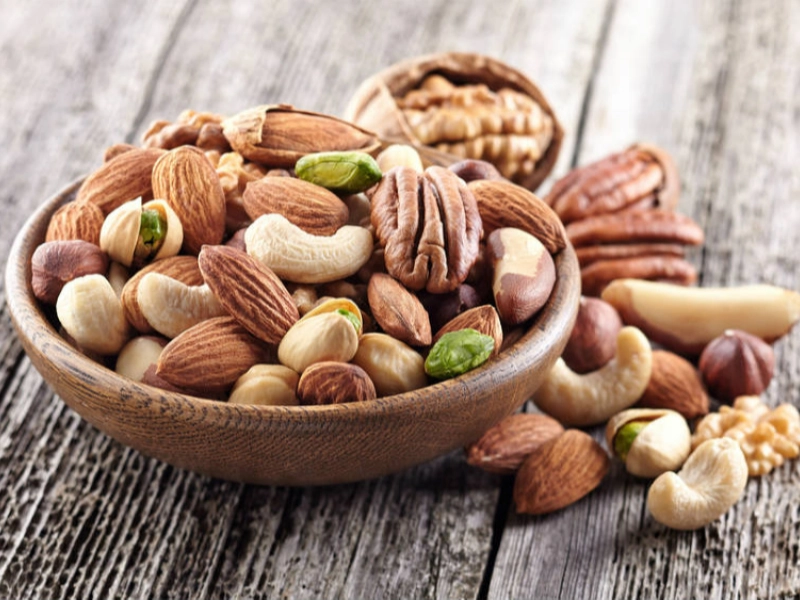 Due to their high content of monounsaturated fats, cashews may help improve good cholesterol levels and decrease dangerous low-density lipoprotein (LDL) cholesterol. Additionally, they include dietary fibre that is heart-healthy and gives them body and fullness.
Nut lovers have a lower risk of heart disease, according to several large observational studies, such as the Physicians' Health Study and the Nurses' Health Study. Those who ate nuts on a regular basis had a 14% to 20% lower risk of coronary heart disease (CHD) and cardiovascular disease (CVD) than those who ate them infrequently.
Add walnuts to fruit and yoghurt, mince pistachios and sprinkle over roasted vegetables, or mix sliced almonds into green salads.
Due to their high content of monounsaturated fats, cashews may help improve good cholesterol levels and decrease dangerous low-density lipoprotein (LDL) cholesterol. Additionally, they include dietary fibre that is heart-healthy and gives them body and fullness.
Nut lovers have a lower risk of heart disease, according to several large observational studies, such as the Physicians' Health Study and the Nurses' Health Study. Those who ate nuts on a regular basis had a 14% to 20% lower risk of coronary heart disease (CHD) and cardiovascular disease (CVD) than those who ate them infrequently.
Add walnuts to fruit and yoghurt, mince pistachios and sprinkle over roasted vegetables, or mix sliced almonds into green salads.







